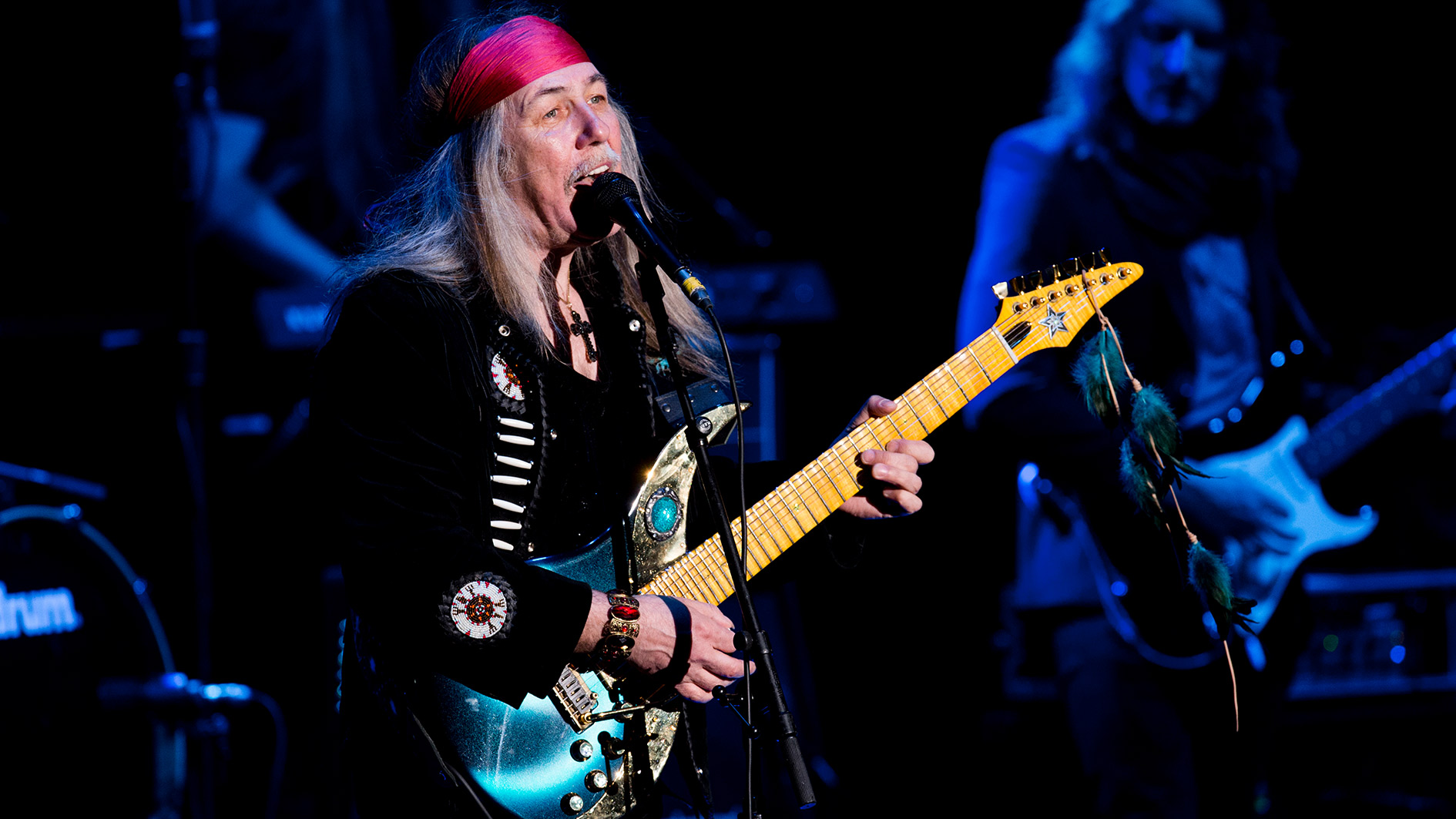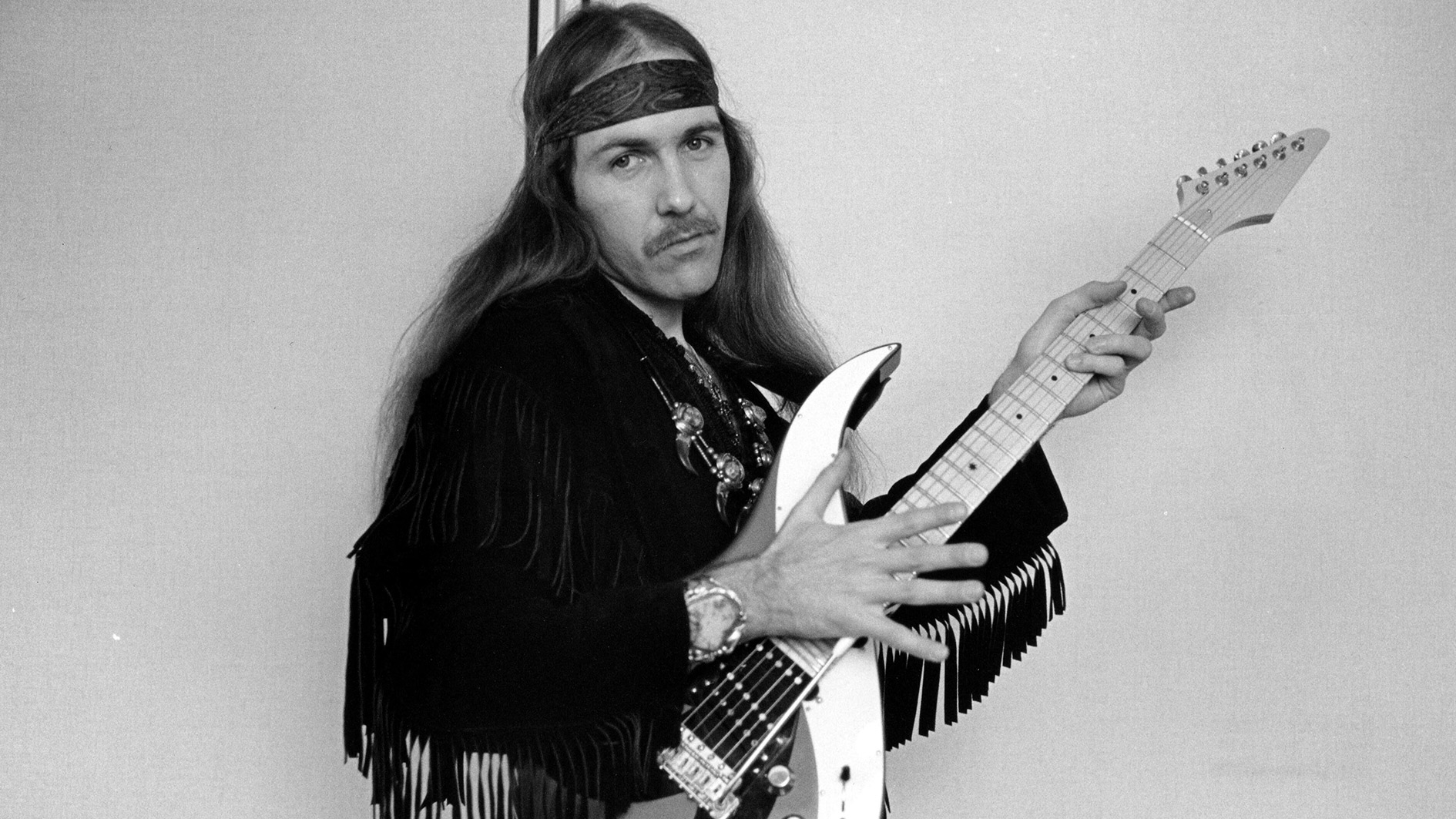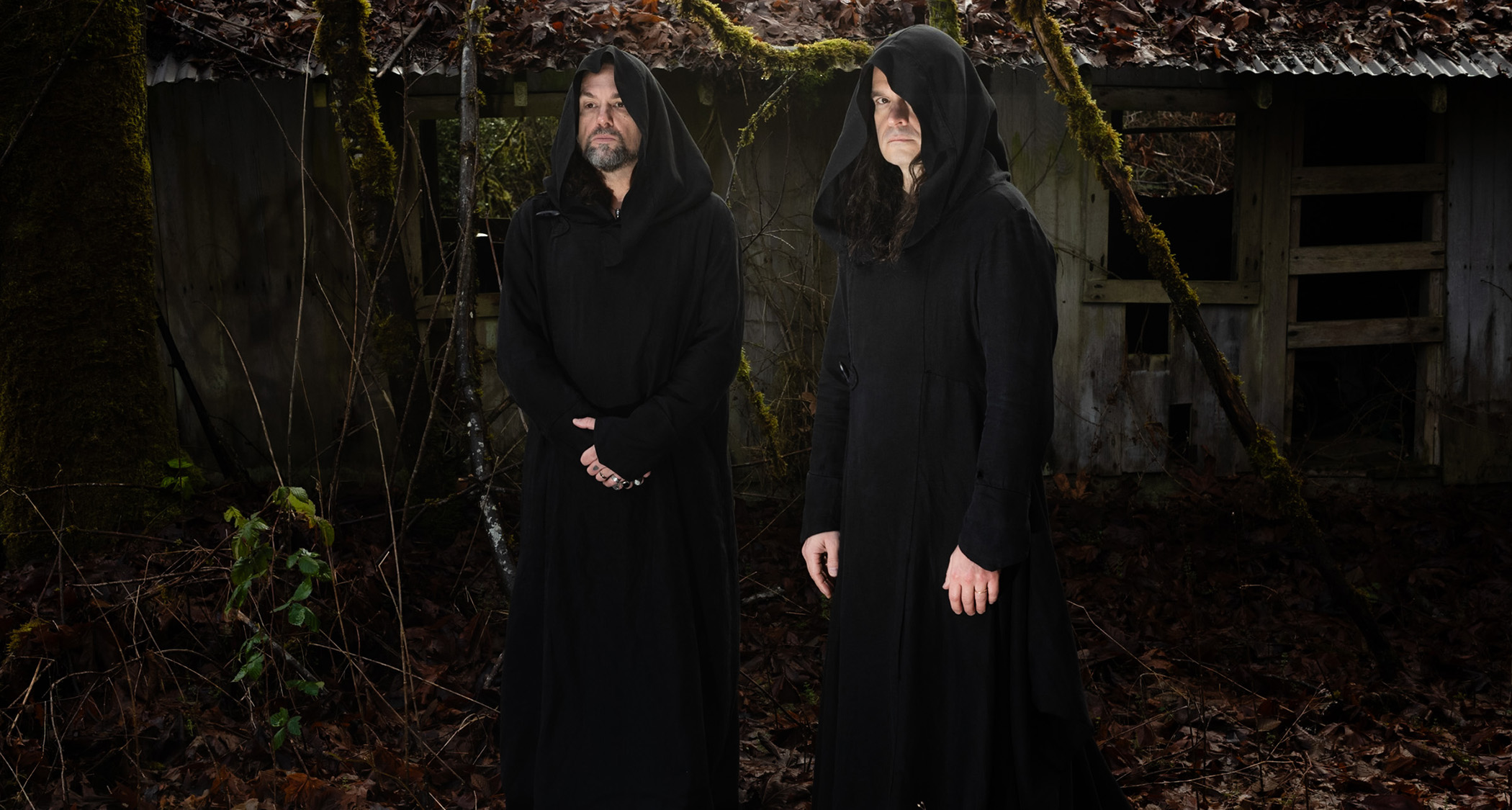Uli Jon Roth: “For me, the heavy metal direction was boring. I wasn't interested in it. I wanted to go in almost the opposite direction”
The German virtuoso on how feeling in “musical no man's land” led to his decision to leave Scorpions in 1975, and go on to spearhead a new style of neoclassical guitar – and what he thinks about Kirk Hammett quoting his solos in Metallica's Battery

As an anti-hero shredder in the proto-metal age, German-born guitarist Uli Jon Roth set the world alight in the '70s with Scorpions. By combining classical elements with hard rock undertones, Roth unintentionally created a neoclassical style that would go on to be mimicked ad nauseam just a decade later.
“A ‘trendsetter’. That's what I've heard people call me, but I have no interest in these sorts of labels,” Roth balks. “The idea of people obsessing about the latest display of physical dexterity on a guitar, I find that quite boring. I'm really interested in saying something meaningful that can touch people in ways that go straight to the heart.
“And the orchestral thing still has so much untapped potential in terms of the sheer sonic beauty of what's possible. I couldn't achieve that in the rock field alone because, to me, there's nothing more beautiful than the sound of these unamplified instruments combined with electric ones.”
Throughout four albums with the Scorpions – Fly to the Rainbow (1974), In Trance (1975), Virgin Killer (1976), and Taken by Force (1977) – Roth upended the guitar scene by injecting Mozart and Bach where others might substitute B.B. King or Muddy Waters. With each successive record, Roth pushed the boundaries of exploration to regions unknown, deconstructing all that his peers thought they once knew.
“I remember my mindset in the '70s; I did very much identify with my guitar,” admits Roth. “But now, I don't think of myself as a guitarist; I'm a musician, and I'm an artist. I'm interested in producing art. I want to make things that have meaning. Am I a guitar player? Sure, I'm a guitar player. Of course, I've always been a guitar player. I always will be.”
“But before the Scorpions, I walked away from it. I didn't actively decide to do that; I just did it,” Roth continues. “And during Covid, I didn't touch the guitar for over two years. I didn't play the guitar and did not desire to do so. But when I picked it up again, everything was fine. I didn't lose anything. And I was never worried because I knew that was gonna happen. I'm not one of these people who needs to play constantly because I think it's all pretty much all in the mind.”
In the late '70s, when Roth made the bold decision to walk away from the Scorpions as they were on the precipice of success, many around the guitarist felt him absurd, but not Roth. No, the off-the-beaten-path six-stringer had a road to follow, driven by artistic desire and a visceral need to follow his ambition of chasing the sounds swirling in his head.
All the latest guitar news, interviews, lessons, reviews, deals and more, direct to your inbox!
Some felt he was crazy, and in some ways, perhaps Roth was. But the truth is that wild decisions, blind ambition, and a touch of magic drive music's greatest success stories.
Whether through his iconic early work with the Scorpions – which would eventually shape the band's continued direction – or his creation of the hyper-innovative Sky Guitar, Roth's creative approach has been intrinsically guided by his heart's desire as opposed to potential commercial gains.
“My favorite thing to do is to work on orchestral projects,” Roth says. “I still desire to somehow find a new way to move forward and explore what can be done with orchestras in combination with elements of rock. I think there's still a lot of mileage there and a lot of new ground that can be covered.”
“I can hear that in my mind's eye, and that's what I want to do,” continues Roth. “I will never stop chasing these sounds that I hear in my head. I will never relinquish my need to create. It's not easy to make what I want to do a reality; it takes a lot of work and a trained ear. But I feel it's there, and a lot of ground is left to cover. And I plan to cover that ground and more.”
With big dreams, a clear vision, and electricity flowing through his fingertips, Uli Jon Roth clocks in with Guitar World to dial back to his earliest origins with the guitar, his time with Scorpions, his love for classical music, and the creation and intention behind the infamous Sky Guitar.

Your love for classical music is well-known, but the blues influenced you most early on, right?
“Yes, I was very much into the blues at the beginning when I first started learning the guitar. I aspired to make music like Eric Clapton while he was with John Mayall before Cream. Those were the songs that I learned and where I started to find my way as a lead guitar player. And then maybe later, Jimi Hendrix and Johnny Winter came into my life, and they had a huge influence on me, too.
“But most of that started to fade away when I was around 15 when I began to get more into classical guitar, fingerstyle, Bach, and various composers. Once that happened, I veered away from the electric guitar and put more emphasis on classical piano.
“The blues thing was just an initial way of getting to know the guitar, and then I started moving beyond the pentatonic scales and became fascinated by classical music.”
How did you first meet Rudolf Schenker before joining the Scorpions?
“I think I met him around 1970, maybe two or three years before we joined forces. We were both a part of the scene in Hanover, Germany, and we'd run into each other and talk music and guitar. I remember that I had spoken to Rudolf maybe a couple of times in those days, but it never got to a point where we were talking about putting together a band or anything like that.
“But then there came a point in 1973 when the early version of the Scorpions broke up because Michael Schenker had decided to leave, go to England, and join UFO.
“So, that really blew the Scorpions apart, and that's when Rudolf and I started to join forces. I remember he asked me to play a show he still had on the books as the Scorpions, which I did.
“And we both enjoyed the collaboration so much that he started to sit in with my band Dawn Road, which was a four-piece. And soon after that, Klaus Meine decided to come on board, and before we knew it, we changed the name to the Scorpions, and there was a new beginning.”
Once I got my feet wet, I was consciously pushing the envelope of the electric guitar in various directions
The Scorpions' first record, Lonesome Crow, is more in line with prog-rock. What was your vision for Fly to the Rainbow?
“I honestly tried not to think about what Michael Schenker did before me. I didn't think about any of that. At that time, my plan was to play what I felt was right for the music on the table. Our version of the Scorpions felt like a new beginning, so I threw out what Michael did and looked forward from day one.
“But honestly, there wasn't much of a longterm vision, it was very instinctual, and the things I played on Fly to the Rainbow came to me in the moment. An inner voice guided me through the music, and I just played what I felt.
“I suppose that I might have looked toward the future at some point, and eventually, I had certain aspirations of what I wanted to do on the guitar, but not at that point. You have to remember, those were very early days, and I had only just picked up the guitar again after not seriously playing it for a long time. So, for me, it was a new beginning in several ways.
“Looking back on it, that album did send me down an exploratory road, but maybe that is not very evident on Fly to the Rainbow. But I will say that once I got my feet wet, I was consciously pushing the envelope of the electric guitar in various directions.”
In Trance feels a bit less instinctual and more planned out. Was that the case?
“People often call it a decision, but it wasn't a decision. These things just emerged naturally. We wrote a bunch of songs, and this is what emerged. A lot of people theorize that we hated the prog sound or that I was dead set on deviating from what Michael did, but it's not the case.
“There was no big strategy that was being planned; we did what we were inspired to do at that time. I would say that on the In Trance album, that is when we began to plan what we were doing, but this was after we naturally found the direction that we wanted to go in.
“But before that, what we did was spur of the moment, with the only intention being to deliver the finest quality possible. The studio we were in for Fly to the Rainbow, Musicland Studios, wasn't so great, but we gave it our best shot, and I think we delivered.
If you look at the guitar playing on In Trance and Virgin Killer, I will say what I was doing on Virgin Killer was a hyper jump. Thinking about it, there were quite a few things on that album that had not been done on electric guitar before
“But the biggest thing with In Trance was that it was the Scorpions' first record with Dieter Dierks, and we recorded it at Dierks Studios. Dirk was huge, and being in the studio was amazing and a huge step up. So, with In Trance, you can begin to hear his influence over the band.”
How would you measure the progression from In Trance to Virgin Killer?
“It was quite a big step. By that point, we had come together as a band and were in quite a good flow. Our songwriting started to get stronger and stronger, and with that, we began to sound better and better. If you listen to Virgin Killer, you can hear progress on all fronts, especially with the guitars.
“If you look at the guitar playing on In Trance and Virgin Killer, I will say what I was doing on Virgin Killer was a hyper-jump. Thinking about it, there were quite a few things on that album that had not been done on electric guitar before.
“I was consciously pushing the envelope with that one, and I think that one was highly influential on a lot of music going forward. I guess, in some ways, that record was a coming-out part of what I wanted to do with the guitar.”
What were the things that had not been done before?
“Well, for instance, look at a song like Catch Your Train; that was something new. That kind of guitar playing was an entirely new style, not one that had been done before. And if you look at my guitar leads on Yellow Raven, that's some seriously inventive stuff there, and it was way ahead of the typical style of rock guitar you would have seen in the '70s.
“If you turned on your radio back in 1975, '76, or whenever, you would not have heard guitars like that from other rock bands back then. It was all new. And then you pair that with the phenomenal vocals from Klaus, who was incredible throughout the whole album.
“Honestly, he was in top form, and it showed to the point that I thought it was pretty inspiring. That inspiration inspired my guitar playing; it was extremely intense and over the top in quite a few ways.”
With Taken by Force, mentally, I was gone. I felt a genuine sense of disconnection, you know? And that's why I only contributed three songs, whereas, on the previous ones, I had written, like, half the material
As I understand it, In Trance and Virgin Killer are your two favorite Scorpions records. Why do you prefer them over Fly to the Rainbow or Taken by Force?
“That is true, but it's hard for me to pin it down. I guess I like the songs on those albums. I feel that the performances are strong, but there are some good songs on Taken by Force, like We'll Burn the Sky, for instance.
“I think Fly to the Rainbow was an example of us searching, so I don't think it was as good for that reason. But with Taken by Force, it was a good record, so maybe it's more of a personal thing. Because by that time, I had all but disconnected from the Scorpions in my mind. And that happened because I had made up my mind that I was going to leave before we started recording the album in the studio.
“So, I'd already decided to leave the Scorpions, which affected my outlook on Taken by Force. I don't want to make it seem that I was half-assed about it, but I was more into the previous recordings. I really did pour my heart and soul into In Trance and Virgin Killer, which is why I have such a fondness for those records.
“Whereas, with Taken by Force, mentally, I was gone. I felt a genuine sense of disconnection, you know? And that's why I only contributed three songs, whereas, on the previous ones, I had written, like, half the material.”

What led to your decision to leave the Scorpions?
“My mind was full of music that was very unsuitable for the Scorpions. I wanted to do new things, and I didn't believe the other band members would be into it, so I didn't even bring it to the table. We had established a direction that was very early hard rock and heavy metal, and even though I had helped create that, I no longer felt close to it.
“I was in a musical no man's land, where I was helping the Scorpions make this heavy rock music, but in my mind, I heard new sounds that I wanted and needed to explore. So, I decided to leave the Scorpions to pursue what I heard in my head. And when I did that, I left the construct of music as I knew it behind forever, and I never looked back.”
Given the success the Scorpions found in the late '70s and the '80s, do you ever regret your decision?
“You know, maybe I should have stayed for the first American tour; that was maybe a strategic mistake on my part. But other than that, I didn't have a choice because I felt pretty unhappy toward the end. I wanted to do a different kind of music, and I would have gone mad had I stayed doing something my heart wasn't in with the Scorpions.
The '80s was very much the mindset of American corporate stadium rock, and I found that entirely boring and unimaginative
“So, I didn't have a choice; it was a purely artistic decision. I cannot stress enough that my artistic integrity drove that decision. Because we were all good friends at the time, so there was never a personal issue; it was always about my need to pursue a different sort of music that I couldn't make with the Scorpions.”
What were your musings as the style you aided in creating became so prominent in the '80s?
“I've had a lot of people tell me they feel I created this style, and I guess there is probably some truth in that. But I never analyzed that to any great extent because, in the '80s, I stopped listening to what was happening. I didn't pay attention to any of it because I found all of it uninteresting.
“For me, the heavy metal direction was boring. I wasn't keen on it. I wasn't interested in it. I wanted to go in almost the opposite direction. But that wasn't fashionable then because the spirit of the time was metal, driven by the mindset of the audience, big record companies, MTV, and the general public.
“So, the '80s was very much the mindset of American corporate stadium rock, and I found that entirely boring and unimaginative. I mean, is it great to play in the stadium? Yeah, okay, sure, I've always enjoyed that, although it is kind of bizarre because the actual sound quality is usually atrocious.
“But it is what it is, and it's an exciting event. Things like that will always be exciting simply because there are so many people dancing to the same tune at the same time. And while I find that fascinating, at the same time, the music that's necessary to fill a stadium is not remotely the kind of music I like to listen to in my spare time.”
Is that what prompted your shift toward symphonic work?
“Yes, but that shift was gradual. Ever since I started listening to classical music and started studying it actively, in the back of my mind, I had always been inspired to one day be able to write music of that kind on that level. But since I was in the rock genre, it felt natural to try and find a way to somehow bring my love of this other world into what I was doing in the rock world, you know?
“Now, I wasn't the first to do that because Emerson, Lake & Palmer did it, Rick Wakeman did it, and Jon Lord did it. But when it comes to guitar players, there weren't many doing that before me. Again, I don't think any were doing it before me. It was usually keyboard-related people doing it, not guitar players.”
Considering you didn't pay much attention to popular music, were you aware that Metallica borrowed some of your stylings for their track Battery?
“No, I was not. You might not believe me, but I had absolutely no idea that they used some things from The Sails of Charon. I never listened to those things and wasn't remotely tapped into the rock and metal scene by that time. I mean, people may have played me the occasional song or something like that, but I wasn't familiar.
I stopped listening to new music many years ago. I think that began during my last days with the Scorpions
“The way I found out was that I have a good friend in Los Angeles who used to hang out with Metallica, and he used to be friends with them. So, they told me some of those things about what Kirk Hammett had played on Battery, but it wasn't on my radar at all because I was never into heavy metal.
“I guess it was flattering in some ways, and it proves what a lot of people say about my influence, but when it happened, I had no idea until my friend told me.”
How did your Sky Guitars play into what you were trying to do post-Scorpions?
“Those were guitars that I had a friend, Andreas Demetriou, make for me back in the '80s. Like I said before, I had this idea of merging the rock world I was in with the classical world I had wanted to travel to, so I had Andreas make a guitar that could sound like a violin. We did this by adding more frets to the guitar. So, instead of 20-something, the first Sky Guitar had 30 frets, and I used that one on Beyond the Astral Skies.
“And then the versions after that first one were either fretless after that 30th fret or had whole step spacing above the 27th fret. These guitars were designed to combine all the elements I wanted to connect, so I had Andreas add scalloped fretboards and humbuckers to give that hot sound.
“They've been a big part of me merging the world of rock music I was in with the classical sounds I wanted to create. I'm very proud of those guitars. I still have a few of them, and I still use them.”

How would you best describe your compositional style?
“You know, I've absolutely never thought about that. I don't know; I guess I don't think about compositional style. I mean, as you said, many guitar players began to do what I had been doing since the '70s, but as I said, I didn't follow any of that at the time. This will sound strange, but I stopped listening to new music many years ago. I think that began during my last days with the Scorpions.
“Instead, I'd play a lot of pianos and draw inspiration from that rather than what might have been happening around me. I'd study old Mozart and Bach scores to understand how they worked.
“Even when I was playing rock music, I wasn't drawing inspiration from other rock music; it was always from classical music. I never got inspiration from rock music, and I still don't. I couldn't name you one new rock song even if I wanted to.”
I would say I'm really not a music consumer. I'm not the guy who has music constantly playing in the background or feels like he can't live without it
Where do you draw inspiration from in the present day?
“I have found my way of expressing music in my own way, which brings me a great deal of happiness. To this day, I don't need to check out the latest music; things like hip-hop and pop music don't do anything for me. When it comes to new music, honestly, I rarely hear something that touches me.
“I still get bored very quickly with music, and I have to say, I'm very finicky. So, I would say I'm really not a music consumer. I'm not the guy who has music constantly playing in the background or feels like he can't live without it.
“I have to say that as much as I love music – and I do love music with all my heart – I don't need to physically listen to it to be inspired to create it. I see music everywhere. I see it in a tree. I see it in plants. I see it in people, dogs, cats, or even – and this will sound ridiculous – I see it in a fence or whatever.
“I see the world with my musical eyes in terms of harmony, rhythm, and musical energy. And that is the same energy we use to live; it's the life force. So, I love music, but I also love silence. I love to sit and think. I've been in this headspace since I left the Scorpions, and it's never changed. I don't think it ever will.”
Andrew Daly is an iced-coffee-addicted, oddball Telecaster-playing, alfredo pasta-loving journalist from Long Island, NY, who, in addition to being a contributing writer for Guitar World, scribes for Bass Player, Guitar Player, Guitarist, and MusicRadar. Andrew has interviewed favorites like Ace Frehley, Johnny Marr, Vito Bratta, Bruce Kulick, Joe Perry, Brad Whitford, Tom Morello, Rich Robinson, and Paul Stanley, while his all-time favorite (rhythm player), Keith Richards, continues to elude him.




